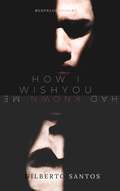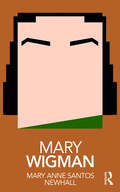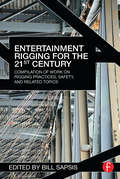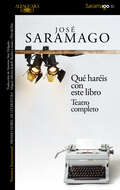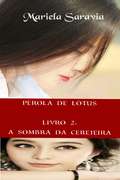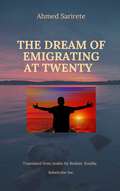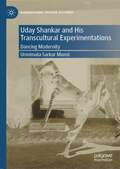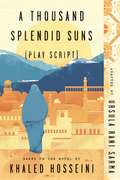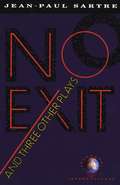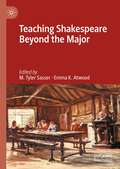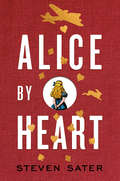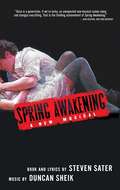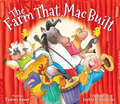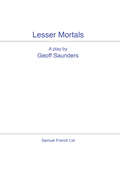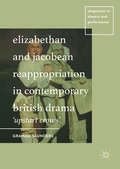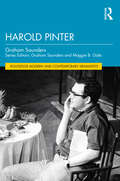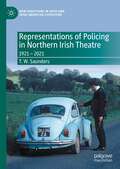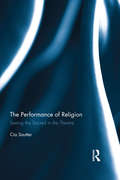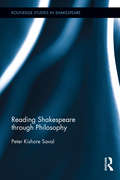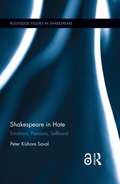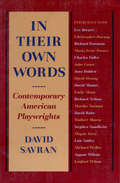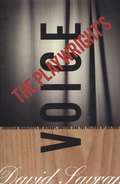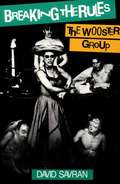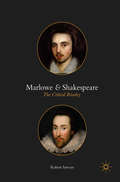- Table View
- List View
How I wish you had known me (DRAMA / Gay & Lesbian #1)
by Gilberto SantosIs it possible to fall in love with someone who's already gone? Lucas and Lauro never met, not in this life... But what would only be an uncompromising holiday trip in the interior of São Paulo turns around the life of Lauro, a psychologist always willing to help. His beliefs are to put to the test amid events that defy logic. After being involved in a mysterious suicide that would hit the small town of Vinhedo, his help to the dead's family would not end as expected; soon Lauro would be involved and in love with Lucas. On the other side, unknowingly, it would also be helping his soul mate to rise spiritually. Follow and be moved by this story, which leaves no doubt that death is just a journey and that soul mates really exist
Mary Wigman: Modernity And Mary Wigman, 1886--1973 (Routledge Performance Practitioners)
by Mary Anne Santos NewhallThis book considers dancer, teacher, and choreographer Mary Wigman, a leading innovator in Expressionist dance whose radical explorations of movement and dance theory are credited with expanding the scope of dance as a theatrical art. Now reissued, this book combines: a full account of Wigman’s life and work an analysis of her key ideas detailed discussion of her aesthetic theories, including the use of space as an "invisible partner" and the transcendent nature of performance a commentary on her key works, including Hexentanz and The Seven Dances of Life an extensive collection of practical exercises designed to provide an understanding of Wigman’s choreographic principles and her uniquely immersive approach to dance. As a first step towards critical understanding, and as an initial exploration before going on to further, primary research, Routledge Performance Practitioners are unbeatable value for today’s student.
Entertainment Rigging for the 21st Century: Compilation of Work on Rigging Practices, Safety, and Related Topics
by Bill SapsisFrom the basics of physical forces and mathematical formulas to performer flying and stage automation, Entertainment Rigging for the 21st Century provides you with insider information into rigging systems and the skills you need to safely operate them. Over the past decade, the entertainment industry has witnessed major changes in rigging technology, as manually operated rigging has given way to motorized systems in both permanent and touring productions, and greater attention has been paid to standardizing safety practices. This book leads you through what is currently happening in the industry, why it’s happening, and how. Accessible for riggers and non-riggers alike, it contains details on the technology and methodology used to achieve the startling effects found in concerts and stage shows. With a foreword written by Monona Rossol, this text contains contributions from industry leaders including: Rocky Paulson Bill Gorlin Tray Allen Roy Bickel Keith Bohn Karen Butler Stuart Cox Bill Sapsis Dan Culhane Eddie Raymond Chris Higgs Carla Richters Joe McGeough Scott Fisher
Qué haréis con este libro
by José SaramagoToda la obra dramática del Premio Nobel de Literatura portugués reunida en un solo volumen por primera vez en español: una perfecta combinación de ideas plenamente vigentes y maestría literaria. «La memoria es el dramaturgo que todos tenemos dentro. Pone en escena e inventa un disfraz para cada ser vinculado con nosotros. La distancia entre lo que fue una persona y lo que se recuerda de ella es literatura.»José Saramago José Saramago se llamaba a sí mismo «el dramaturgo involuntario» porque siempre sintió que su contribución a ese género venía marcada por circunstancias azarosas. Pero incluso así, su genio creativo dio luz a las cinco obras teatrales que se reúnen ahora en este volumen: La noche (1979), ¿Qué haré con este libro? (1980), La segunda vida de Francisco de Asís (1987), In Nomine Dei (1993) y Don Giovanni o El disoluto absuelto (2005). Salvo La noche e In Nomine Dei, se publican por primera vez en castellano. Con la hondura propia de toda su obra -aunque revestida de una aparente simplicidad-, brilla en estas piezas magistrales la ironía del autor y la agudeza de sus reflexiones. Los grandes héroes dejan paso a los hombres y mujeres sencillos que, desde la honestidad y la firmeza de sus convicciones, luchan por la libertad, la justicia y un futuro mejor. Ambientadas en lugares y épocas distintos que van desde el Portugal del triunfo de la revolución de los Claveles o el renacentista del poeta Camões, a la Alemania de la reforma luterana, la Italia de don Giovanni o la intemporalidad deslocalizada de una empresa en crecimiento, en ellas las grandes cuestiones que caracterizan el pensamiento del autor están expuestas sin enjuiciamientos ni sentencias. Todas ellas son parte de un diálogo que Saramago mantiene para siempre, desde cada una de las páginas que escribió, con sus lectores.
Qué haréis con este libro: Teatro completo
by José SaramagoToda la obra dramática del Premio Nobel de Literatura portugués reunida en un solo volumen por primera vez en español: una perfecta combinación de ideas plenamente vigentes y maestría literaria. «La memoria es el dramaturgo que todos tenemos dentro. Pone en escena e inventa un disfraz para cada ser vinculado con nosotros. La distancia entre lo que fue una persona y lo que se recuerda de ella es literatura.»José Saramago José Saramago se llamaba a sí mismo «el dramaturgo involuntario» porque siempre sintió que su contribución a ese género venía marcada por circunstancias azarosas. Pero incluso así, su genio creativo dio luz a las cinco obras teatrales que se reúnen ahora en este volumen: La noche (1979), ¿Qué haré con este libro? (1980), La segunda vida de Francisco de Asís (1987), In Nomine Dei (1993) y Don Giovanni o El disoluto absuelto (2005). Salvo La noche e In Nomine Dei, se publican por primera vez en castellano. Con la hondura propia de toda su obra -aunque revestida de una aparente simplicidad-, brilla en estas piezas magistrales la ironía del autor y la agudeza de sus reflexiones. Los grandes héroes dejan paso a los hombres y mujeres sencillos que, desde la honestidad y la firmeza de sus convicciones, luchan por la libertad, la justicia y un futuro mejor. Ambientadas en lugares y épocas distintos que van desde el Portugal del triunfo de la revolución de los Claveles o el renacentista del poeta Camões, a la Alemania de la reforma luterana, la Italia de don Giovanni o la intemporalidad deslocalizada de una empresa en crecimiento, en ellas las grandes cuestiones que caracterizan el pensamiento del autor están expuestas sin enjuiciamientos ni sentencias. Todas ellas son parte de un diálogo que Saramago mantiene para siempre, desde cada una de las páginas que escribió, con suslectores.
Pérola de Lótus - livro 2: a sombra da cerejeira
by Mariela Saravia Ana Paula Ruth LimaCom a morte de Donovan, Kiele deixe de se sentir parte de Londres e de Adolf, aquele homem que tanto ama, pois seu sangue inglês foi à maldição de seu povo. Trabalha em diferentes ofícios, até que chega a uma família londrina estabelecida na China e se transforma na instrutora da filha de um poderoso empresário. Rubén Mosses é um homem de poder, que procura a forma de fazê-la sua amante, mas quando Kiele está disposta da lhe dar uma relação extra-matrimonial, estoura a Segunda Guerra do Ópio, que a obriga se separar daquela família que a acolheu por seis anos e, sobretudo, da menina Catarina que nessa época já era uma jovem de quinze anos. Diante da noticia de que a China se encontra em Guerra de novo, Adolf McColl realiza a viajem para China que estava adiando, agora não em busca de tecidos para seu império, mas sim para proteger a única mulher que amou e segue amando. Mas, as visões da morte não o deixam em paz, e a dúvida de não saber se Kiele está viva ou morta, lhe torturam até o cansaço.
The Dream of Emigrating at Twenty (Immigration #1)
by Ahmed SarireteAfter reaching his twentieth birthday, Mourad, a university student, never imagined that the first and riskiest decision that fate would push him to make in his new life would be to immigrate clandestinely, or as the Algerians call it "Harga". Luckily, he knew people who would help him achieve his dream without any financial compensation, but fate was against him every time he tried to accomplish his project, so he finally realized that the secret method of immigration was not designed for him, for a reason only God knows. Therefore, he decided to return home disappointed, after having left without informing his parents of his intention to emigrate. On his way back home, he was once again driven by fate to fulfill his dream of emigrating in another strange way, with a new hope and stimuli he had never imagined!
Uday Shankar and His Transcultural Experimentations: Dancing Modernity (Transnational Theatre Histories)
by Urmimala Sarkar MunsiThis monograph presents a specific experience of modernity within the context of Indian dance by looking at the transcultural journey of Indian dancer / choreographer Uday Shankar (1900b – 1977d). His popularity in Europe and America as an Oriental male dancer in the first half of the 20th century, and his worldwide recognition as the Ambassador of Indian culture, are brought into a historiographical perspective within the cultural and social reforms of early twentieth century India. By exploring his artistic journey beyond India in the period between the two world wars, and his experience of dance making, presentational technique and representation of India through various phases of his life, a path is forged to understanding the emergence of modernity in Indian dance.
A Thousand Splendid Suns (Play Script): Based on the novel by Khaled Hosseini
by Ursula Rani SarmaThe script for the stage production of the bestselling Khaled Hosseini novel A Thousand Splendid Suns, as adapted by playwright Ursula Rani Sarma.Born a generation apart and with very different ideas about love and family, Mariam and Laila are two women brought jarringly together by war, by loss, and by fate. As they endure the ever-escalating dangers around them--in their home, as well as in the streets of Kabul--they come to form a bond that makes them both sisters and mother-daughter to each other, and that will ultimately alter the course not just of their own lives but of the next generation. With heart-wrenching power and suspense, playwright Ursula Rani Sarma reimagines Hosseini's novel to show how a woman's love for her family can move her to shocking and heroic acts of self-sacrifice, and that in the end it is love, or even the memory of love, that is often the key to survival.A stunning accomplishment, this reimagination of A Thousand Splendid Suns is a haunting, heartbreaking, compelling production about unlikely friendship and indestructible love.This adaptation was first performed by the American Conservatory Theater in San Francisco in February 2017.
No Exit and Three Other Plays
by Jean-Paul SartreFour plays about an existential portrayal of Hell, the reworking of the Electra-Orestes story, the conflict of a young intellectual torn between theory and conflict and an arresting attack on American racism.
Teaching Shakespeare Beyond the Major
by M. Tyler Sasser Emma K. AtwoodThis edited collection considers the task of teaching Shakespeare in general education college courses, a task which is often considered obligatory, perfunctory, and ancillary to a professor’s primary goals of research and upper-level teaching. The contributors apply a variety of pedagogical strategies for teaching general education students who are often freshmen or sophomores, non-majors, and/or non-traditional students. Offering instructors practical classroom approaches to Shakespeare’s language, performance, and critical theory, the essays in this collection explicitly address the unique pedagogical situations of today’s general education college classroom.
Alice By Heart: Victim Sidekick Boyfriend Me; Journey To X; Little Foot; Prince Of Denmark; Socialism Is Great; The Grandfathers; Alice By Heart; Generation Next; So You Think Youre A Superhero?; The Ritual (Play Anthologies Ser.)
by Steven SaterA young girl takes refuge in a London Tube station during WWII and confronts grief, loss, and first love with the help of her favorite book, Alice in Wonderland, in the debut novel from Tony Award-winning playwright Steven Sater.London, 1940. Amidst the rubble of the Blitz of World War II, fifteen-year-old Alice Spencer and her best friend, Alfred, are forced to take shelter in an underground tube station. Sick with tuberculosis, Alfred is quarantined, with doctors saying he won't make it through the night. In her desperation to keep him holding on, Alice turns to their favorite pastime: recalling the book that bonded them, and telling the story that she knows by heart--the story of Alice in Wonderland. What follows is a stunning, fantastical journey that blends Alice's two worlds: her war-ravaged homeland being held together by nurses and soldiers and Winston Churchill, and her beloved Wonderland, a welcome distraction from the bombs and the death, but a place where one rule always applies: the pages must keep turning. But then the lines between these two worlds begin to blur. Is that a militant Red Cross Nurse demanding that Alice get BACK. TO. HER. BED!, or is it the infamous Queen of Hearts saying...something about her head? Soon, Alice must decide whether to stay in Wonderland forever, or embrace the pain of reality if that's what it means to grow up. In this gorgeous YA adaption of his off-Broadway musical, the Tony Award-winning co-creator of Spring Awakening encourages us all to celebrate the transformational power of the imagination, even in the harshest of times.
Spring Awakening
by Steven Sater Duncan Sheik"This brave new musical, haunting and electrifying by turns, restores the mystery, the thrill to that shattering transformation that stirs in all our souls."--Charles Isherwood, The New York Times"The staggering purity of this show will touch all open hearts...In its refined, imaginative simplicity, it daringly reverses all the conventional rules by returning the American musical to an original state of innocence."--John Heilpern, The New York Observer"An unexpected jolt of sudden genius, edgy in its brutally honest, unromanticized depiction of human sexuality."--New York Post Spring Awakening is an extraordinary new rock musical with book and lyrics by Steven Sater and music by Grammy Award-nominated recording artist Duncan Sheik. Inspired by Frank Wedekind's controversial 1891 play about teenage sexuality and society's efforts to control it, the piece seamlessly merges past and present, underscoring the timelessness of adolescent angst and the universality of human passion. Steven Sater's plays include the long-running Carbondale Dreams, Perfect for You, Doll (Rosenthal Prize/Cincinnati Playhouse), Umbrage (Steppenwolf New Play Prize), and a reconceived version of Shakespeare's Tempest, which played in London. Duncan Sheik is a singer/songwriter who also collaborated with Sater on the musical The Nightingale. He has composed original music for The Gold Rooms of Nero and for The Public Theater's Twelfth Night in Central Park.
The Farm That Mac Built
by Tammi SauerThe scarecrow from Old Mac Donald&’s farm emcees a barnyard theater production that collapses into hilarious chaos in this rollicking rendition of &“The House That Jack Built.&” It&’s showtime on Old Mac Donald&’s Farm! The barnyard animals are putting on a play—a farm version of "The House That Jack Built"— but other animals keep taking the stage and interrupting the production. First some rambunctious monkeys, then breakdancing kangaroos . . . there&’s even a pair of singing elephants. Everyone knows that monkeys, kangaroos, and elephants do NOT belong on a farm . . . so what to do? Bursting with sound effects and rollicking repetition that will have kids clamoring for repeat readings, this hilarious mashup of two favorite nursery rhymes shows that perseverance and teamwork pay off, and that sometimes you just have to roll with the unexpected and try to have fun with it.
Lesser Mortals
by Geoff SaundersFour women — all widows — sit in the communal silence of a Quaker Meeting; we hear their thoughts and join with their joys and troubles. Victoria, the most recently widowed, is resigned to never getting answers to her questions. Wendy has kept her home life secret for years. Tilly’s husband was far from good to her. Elderly Gladys cherishes the memories of her alcoholic beau. Faith, grief, marriage, love and “Quakerly behaviour” are among the themes discussed in this tender and sometimes humorous short drama.
Elizabethan and Jacobean Reappropriation in Contemporary British Drama
by Graham SaundersThis book examines British playwrights' responses to the work of Shakespeare and his contemporaries since 1945, from Tom Stoppard's Rosencrantz and Guildenstern are Dead to Sarah Kane's Blasted and Jez Butterworth's Jerusalem. Using the work of Julie Sanders and others working in the fields of Adaptation Studies and intertextual criticism, it argues that this relatively neglected area of drama, widely considered to be adaptation, should instead be considered as appropriation - as work that often mounts challenges to the ideologies and orthodoxies within Elizabethan and Jacobean drama, and questions the legitimacy and cultural authority of Shakespeare's legacy. The book discusses the work of Howard Barker, Peter Barnes, Edward Bond, Howard Brenton, David Edgar, Elaine Feinstein and the Women's Theatre Group, David Greig, Sarah Kane, Dennis Kelly, Bernard Kopps, Charles Marowitz, Julia Pascal and Arnold Wesker.
Harold Pinter (Routledge Modern and Contemporary Dramatists)
by Graham SaundersHarold Pinter provides an up-to-date analysis and reappraisal concerning the work of one of the most studied and performed dramatists in the world. Drawing extensively from The Harold Pinter Archive at the British Library as well as reviews and other critical materials, this book offers new insights into previously established views about his work. The book also analyses and reappraises specific key historical and contemporary productions, including a selection of Pinter’s most significant screenplays. In particular, this volume seeks to assess Pinter’s critical reputation and legacy since his death in 2008. These include his position as a political writer and political activist – from disassociation and neutrality on the subject until relatively late in his career when his drama sought to explicitly address questions of political dissent and torture by totalitarian regimes. The book revisits some familiar territories such as Pinter’s place as a British absurdist and the role memory plays in his work, but it also sets out to explore new territories such as Pinter’s changing attitudes towards gender in the light of #MeToo and queer politics and how in particular a play such as The Caretaker (1960) through several key productions has brought the issues of race into sharper focus. Part of the Routledge Modern and Contemporary Dramatist series, Harold Pinter provides an essential and accessible guide to the dramatists’ work.
Representations of Policing in Northern Irish Theatre: 1921 – 2021 (New Directions in Irish and Irish American Literature)
by T. W. SaundersThis monograph provides the first sustained, chronological account of Northern Irish police officers’ representation in theatre. Importantly, its scope comprises a critical period of national and organisational development, beginning with the Partition of Ireland in 1921 and the founding of the Royal Ulster Constabulary (RUC) one year later in 1922. It progresses through the relevant theatrical and historical events of the century, through the period after the RUC’s dissolution and replacement with the Police Service of Northern Ireland (PSNI) in 2001, and concludes in 2021 to coincide with the centenary of Partition. As such, this project is distinctive in its ability to trace paradigm shifts in perceptions of the police over time, as they intersect with relevant historical events and milestones of political conflict in the province.
The Performance of Religion: Seeing the sacred in the theatre
by Cia SautterThe performing arts are uniquely capable of translating a vision of an ideal or sacred reality into lived practice, allowing an audience to confront deeply held values and beliefs as they observe a performance. However, there is often a reluctance to approach distinctly religious topics from a performance studies perspective. This book addresses this issue by exploring how religious values are acted out and reflected on in classic Western theatre, with a particular emphasis on the plays put on during the Globe Theatre‘s yearlong season of 'Shakespeare and the Bible'. Looking at plays such as Much Ado About Nothing, Dr. Faustus and Macbeth, each chapter includes ethnographic overviews of the performance of these plays as well as historical and theological perspectives on the issues they address. The author also utilizes scholarship from other academics, such as Paul Tillich and Martin Buber, in examining the relationship between art and culture. This helps readers of this book to look at religion in culture, and raise questions and explore ideas about how people appraise their religious values through an encounter with a performance. The Performance of Religion: Seeing the sacred in the theatre treads new ground in bringing performance and religious studies scholarship into direct conversation with one another. As such, it is essential reading for any academic with an interest in theology, religion and ethics and their expression in culture through the performing arts.
Reading Shakespeare through Philosophy: Reading Shakespeare Through Philosophy (Routledge Studies in Shakespeare)
by Peter Kishore SavalReading Shakespeare through Philosophy advocates that the beauty of Shakespearean drama is inseparable from its philosophical power. Shakespeare’s plays make demands on us even beyond our linguistic attention and historical empathy: they require thinking, and the concepts of philosophy can provide us with tools to aid us in that thinking. This volume examines how philosophy can help us to re-imagine Shakespeare’s treatment of individuality, character, and destiny, particularly at certain moments in a play when a character’s relationship to space or time becomes an enigma to us. The author focuses on the dramatization of seemingly magical relationships between the individual and the cosmos, exploring and rethinking the meanings of 'individual', 'cosmos' and 'magic' through a conceptually acute reading of Shakespeare's plays. This book draws upon a variety of thinkers including Plato, Aristotle, Leibniz and Kant, in search of a revitalized philosophical criticism of Julius Caesar, Love’s Labor’s Lost, The Merchant of Venice, Timon of Athens, and Twelfth Night.
Shakespeare in Hate: Emotions, Passions, Selfhood (Routledge Studies in Shakespeare)
by Peter Kishore SavalHate, malice, rage, and enmity: what would Shakespeare’s plays be without these demonic, unruly passions? This book studies how the tirades and unrestrained villainy of Shakespeare’s art explode the decorum and safety of our sanitized lives and challenge the limits of our selfhood. Everyone knows Shakespeare to be the exemplary poet of love, but how many celebrate his clarifying expressions of hatred? How many of us do not at some time feel that we have come away from his plays transformed by hate and washed clean by savage indignation? Saval fills the great gap in the interpretation of Shakespeare’s unsocial feelings. The book asserts that emotions, as Aristotle claims in the Rhetoric, are connected to judgments. Under such a view, hatred and rage in Shakespeare cease to be a "blinding" of judgment or a loss of reason, but become claims upon the world that can be evaluated and interpreted. The literary criticism of anger and hate provides an alternative vision of the experience of Shakespeare’s theater as an intensification of human experience that takes us far beyond criticism’s traditional contexts of character, culture, and ethics. The volume, which is alive to the judgmental character of emotions, transforms the way we see the rancorous passions and the disorderly and disobedient demands of anger and hatred. Above all, it reminds us why Shakespeare is the exemplary creator of that rare yet pleasurable thing: a good hater.
In Their Own Words
by David SavranIncludes: Lee Breuer, Christopher Durang, Richard Foreman, Maria Irene Fornes, Charles Fuller, John Guare, Joan Holden, David Henry Hwang, David Mamet, Emily Mann, Richard Nelson, Marsha Norman, David Rabe, Wallace Shawn, Stephen Sondheim, Megan Terry, Luis Valdez, Michael Weller, August Wilson and Lanford Wilson.
The Playwright's Voice
by David SavranThis new volume of interviews with contemporary playwrights attests to the fact the dramatic art is alive and well in America and celebrates the art and talent of fifteen of the theatre's most important artists. In extensive interviews, they discuss their work, influences and their craft and how the art form relates to our cultural heritage, as well as the state of theatre-its-meaning and purposes as we approach the 21st Century. David Savran lays out their remarkable achievements and provides telling insights to their work in his substantial introductions to each interview.Interviews with: Edward AlbeeJon Robin BaitzPhilip Kan GotandaHolly HughesTony KushnerTerrence McNallySuzan-Lori ParksJosé RiveraNtozake ShangeNicky SilverAnna Deavere SmithPaula VogelWendy WassersteinMac Wellman and George C. Wolfe.
Breaking the Rules
by David Savran Peter SellarsThrough interviews and descriptions of methodology, Breaking the Rules captures the essence of major works by the internationally acclaimed avant-garde company.
Marlowe and Shakespeare
by Robert SawyerInstead of asserting any alleged rivalry between Marlowe and Shakespeare, Sawyer examines the literary reception of the two when the writers are placed in tandem during critical discourse or artistic production. Focusing on specific examples from the last 400 years, the study begins with Robert Greene's comments in 1592 and ends with the post-9/11 and 7/7 era. The study not only looks at literary critics and their assessments, but also at playwrights such as Aphra Behn, novelists such as Anthony Burgess, and late twentieth-century movie and theatre directors. The work concludes by showing how the most recent outbreak of Marlowe as Shakespeare's ghostwriter accelerates due to a climate of conspiracy, including "belief echoes," which presently permeate our cultural and critical discourse.
